Lithuanians in Afghanistan

[This dispatch is in the RUBS format: Raw, Unedited, Barely Spellchecked.]
29 June 2009
Kabul has changed. In recent years the roads were often clogged with military convoys, filling the town with aggravations and dangers often caused by the mere presence of large  numbers of soldiers in proximity to the dusty beehive called Kabul. Yesterday, in a drive around the city, the only obvious presence was that of the ANA and ANP (Afghan National Army and Police). The few U.S. or other soldiers who could be seen were driving in armored civilian SUVs.
numbers of soldiers in proximity to the dusty beehive called Kabul. Yesterday, in a drive around the city, the only obvious presence was that of the ANA and ANP (Afghan National Army and Police). The few U.S. or other soldiers who could be seen were driving in armored civilian SUVs.
The roads themselves are bad as ever and there seemed to be more trash than before. All westerners and Afghans that I’ve spoken with have said security in Kabul has improved, probably due to the heavy fighting in Pakistan that has drawn attention away. Also, the opium trade is booming 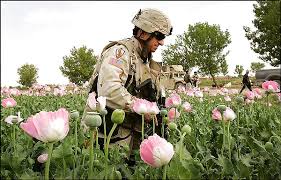 and U.S. forces are increasing their numbers in southern Afghanistan. The fighting has by no means ended – it’s increasing -- but has been taken more to the parking lot.
and U.S. forces are increasing their numbers in southern Afghanistan. The fighting has by no means ended – it’s increasing -- but has been taken more to the parking lot.
The civilian contractors are always interesting to talk with. Many are ex-military,
though the contractors come from many parts of life and the world. Some are pure mercenary and will say so. Others come more for patriotic or humanitarian reasons.Others contractors fall into another category. Neither mercenary, missionary, patriot, or war bum, and they likely could care less why the war is unfolding, or what the outcome. It’s truly just a job, like being on a circus crew. Indians, Nepalese, Thai, Filipinos and many others swarm to Afghanistan. Some have restrictions on where they can work. The Philippines government forbids citizens from working in Iraq or Afghanistan, yet the bases and contracting sites are covered with Filipinos and Filipinas. Yesterday, an Afghan friend picked me up and we drove through town to have lunch in an Afghan restaurant. Large marijuana plants  were growing in the courtyard just near our short table where we sat with no chairs. We talked about the war and it was interesting to hear this Afghan say exactly what I think: “The war is just beginning.” By 3PM, I had to get back to base for a meeting with the Lithuanian Ambassador to Afghanistan, and there at the front gate were ten Filipinos dragging their luggage, helmets and body armor through security. Large apartment complexes are being built – or are already built – where you can stay for about $75/night for a six-month stay. They are sold out. One contractor said that a new complex is being constructed with 2,000 rooms. Another told me that he sees this boom going strong for another 5-8 years, at which point he thinks it will peter out like Iraq. He said he did five years in Iraq and prefers Afghanistan.
were growing in the courtyard just near our short table where we sat with no chairs. We talked about the war and it was interesting to hear this Afghan say exactly what I think: “The war is just beginning.” By 3PM, I had to get back to base for a meeting with the Lithuanian Ambassador to Afghanistan, and there at the front gate were ten Filipinos dragging their luggage, helmets and body armor through security. Large apartment complexes are being built – or are already built – where you can stay for about $75/night for a six-month stay. They are sold out. One contractor said that a new complex is being constructed with 2,000 rooms. Another told me that he sees this boom going strong for another 5-8 years, at which point he thinks it will peter out like Iraq. He said he did five years in Iraq and prefers Afghanistan.

An American contractor with a deep southern accent was hustling the ten Filipinos through the security run by French speaking Belgian soldiers. While we waited for the retinal scans and so forth, the American said he’d worked in Iraq for several years but had shifted to the new war. I asked where he found so many Filipinos --who are forbidden by their own government to come here -- and he said they just show up at his office downtown asking for a job. They cannot fly directly from the Philippines, but through some network they end up on the streets of Kabul and then on bases all over the country. Sometimes I hear the Filipinos on bases at night singing Karaoke.
Thirty minutes later, conversation during the meeting with the Lithuanian Ambassador, Dainius Junevičius, was informal and ranged all over the globe. Literally. He had lived and worked in Poland, as had I, and also in Greece, and the Ambassador remarked that the weather in Kabul is similar to that in Greece. I asked about

quite good. Large numbers of Lithuanians live in the United States, in places like Chicago, and the culture is sufficiently similar to ours that few people would likely notice. Lithuania is a country of about 3.5 million people: roughly 1/10th the population of Afghanistan, and so on the broader scale the Lithuanian contribution is small, but as a matter of relative size they are pulling their share. For example, the Lithuanian special forces have a very good reputation in the fighting elsewhere. Unfortunately it’s difficult to say much about special forces so they must fight in anonymity. The main Lithuanian effort is the PRT (Provincial Reconstruction Team) out in the sprawling, mountainous Ghor Province.
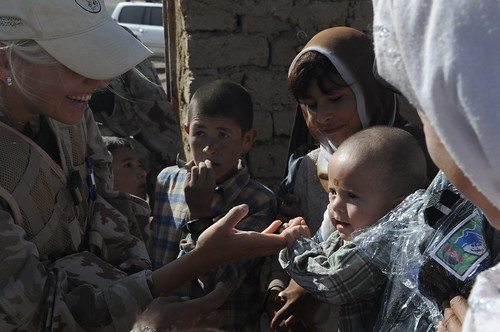 The Lithuanians run the camp at Chaghcharan, the capital of Ghor Province, but they also regularly work in villages. Chaghcharan, the town of maybe 15,000 people that most of us never heard of, is important for various reasons, such as that it sits astride the key route between Kabul and Herat. When you look at a map of bases and PRTs in Afghanistan,
The Lithuanians run the camp at Chaghcharan, the capital of Ghor Province, but they also regularly work in villages. Chaghcharan, the town of maybe 15,000 people that most of us never heard of, is important for various reasons, such as that it sits astride the key route between Kabul and Herat. When you look at a map of bases and PRTs in Afghanistan,

you might think that Commanders tossed darts at the map to select areas of operations. This is not so. There is a story behind every place. There is enemy activity and Iranian influence to the west, for instance, though most of the media seems to focus on the south, the border area, and Kabul. And so beyond immediate humanitarian and development terms, the Lithuanian mission might not seem important
until you look at the map and factor in other items. The Lithuanians are not here on a “feel good” mission to hand out candy and blankets, but to enable Afghans to build their own capacity over the very long haul, and this location could prove very important to us in the future.
The Lithuanians are quick to point out that though they run the Chaghcharan PRT, others who are working aspect of this mission from the same base, such Croatia, Denmark, Georgia, Japan, Ukraine, Romania and the USA.
Afghanistan’s issues are too many to list, yet one of the key problems are roads. All the key participants knows this, and have known it for a long time. “Roads” is not a “revelation,” but the reality remains that places like Chaghcharan are cut off from Kabul for about six months each year simply due to the snows, and floods caused by snow melt, and this means that the important city of Herat is also largely cut off for six months per year.

Ambassador Junevičius said that about a hundred million dollars would be needed to construct that road. This is trivial money on the scale of what we are already spending on the war. But the reality is that everywhere you go, there is the same true story about a need for roads and a host of other essentials if Afghanistan expected to close the gap between pre-history and the Middle Ages. (Much of Afghanistan is still living in what might accurately be describes as pre-history. By comparison, Iraq is very modern.)
Some top U.S. officials will talk about downgrading our expectations for Afghanistan. The numerous Lithuanians that I have spent hours with fully comprehend the enormous dimensions of the situation here. Lithuanians understand struggle; they know the story well because they have successfully struggled through their own darkness, and need for foreign aid, and now are actually investing foreign aid in Afghanistan.
Ambassador Junevičius said that only 8% of the police in the Area of Operations are literate. (Atop that, the Afghans are literate in local languages, not “access” languages such as English. “Literacy” itself is a loaded word.) And so the Lithuanians are investing in schools and other projects. Electricity is as problematic as roads. Large swaths of Afghanistan are as dark as the sea.
Though realizing the difficulties ahead, the Lithuanians seem focused on their slice of the fight. Ambassador Junevičius said, “Lithuanians are committed to this mission for at least the next 4-5 years,” which actually might be enough to get Chaghcharan on the road to the Middle Ages.
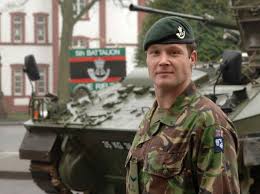
The next morning, a Swedish C-130 in Kabul was about a half-full of passengers, yet even with only maybe thirty passengers, they seemed to come from probably a dozen countries, including a couple Filipinos, and a couple of Sri Lankans, a British soldier from “The Rifles,” a Danish soldier, some U.S. Army officers, including one Colonel I recognized. There was an Australian officer and some other civilians, mostly with weapons, and the four Lithuanian soldiers with me. I was surprised to see Fred and Kim Kagan step aboard. They are a couple of brilliant academics who seem to pop up all other the place. The last time I saw Fred was in December in Bahrain, again on coincidence during my trip with Secretary Robert Gates. I’ve seen Fred and Kim pop up in odd places in Iraq. This wife-husband team were some of the brains and influence behind the “Surge” in Iraq. Andrew Exum also climbed into the C-130 -
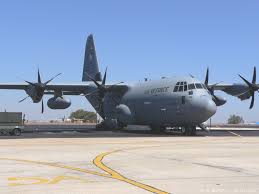 this was getting to be a regular Who’s Who of influence over the future course of this war. In a strange coincidence, I would re-read during the flight the CNAS paper, “TRIAGE: The Next Twelve Months in Afghanistan and Pakistan,”authored by Andrew Exum, Nate Fick, Ahmed Humayun, and David Kilcullen. (A brilliant mix of academics and experience.) On that note, I would highly suggest that folks who want to better understand this war pay attention to the names listed above, and to CNAS: Center For New American Security.
this was getting to be a regular Who’s Who of influence over the future course of this war. In a strange coincidence, I would re-read during the flight the CNAS paper, “TRIAGE: The Next Twelve Months in Afghanistan and Pakistan,”authored by Andrew Exum, Nate Fick, Ahmed Humayun, and David Kilcullen. (A brilliant mix of academics and experience.) On that note, I would highly suggest that folks who want to better understand this war pay attention to the names listed above, and to CNAS: Center For New American Security.And so the Swedish crew flew us from Kabul to Kandahar where the brain-trust stepped off the airplane, and the four Lithuanians and I kept going to Chaghcharan.

The writing about Afghanistan at the moment might not get too far: Even many of the international soldiers over here – including U.S. – often seem more interested in the passing of Michael Jackson and Farrah Fawcett. Especially Michael Jackson. The Lithuanians say the death of Michael Jackson is dominating their home news at the moment.
 I recall one evening when I worked for Mr. Jackson, back while I was studying and long before the scandals, Farrah Fawecett and her husband came over to Neverland for dinner. I let them into the estate. She was very friendly to me. May she rest in peace.
I recall one evening when I worked for Mr. Jackson, back while I was studying and long before the scandals, Farrah Fawecett and her husband came over to Neverland for dinner. I let them into the estate. She was very friendly to me. May she rest in peace.
A similar media dynamic was unfolding recently while I was in the Philippines. A boyfriend of one of the popular movie stars caught her in a sex video, and that vacuumed nearly all the press from crucial events. That’s just the way it is. This war has been on for some eight years, and is now droning in the background.
That’s all for tonight. It’s been a long trip. Tomorrow we go downtown.
[My apologies for using the “RUBS” format, but RUBs is the only way to give daily reports.]
* * * * *
I wanted to add the comments that were included with this dispatch. The comments are always interesting as most are so very in touch with Michael Yon's current location and previous missions. They usually add a bit more perspective to the readers who are following his reports and ask questions that we tend to think ourselves but either don't ask, or are afraid to ask.
Cathi
* * * * *
Commentary to Lithuanians in Afghanistan:
Objectives
Philipinos Arrive
Michael Jackson and Farah Fawsett....You know everybody, Mike.
Love your work. Stay safe.
* * * * *
Sean Pillai interviews Jeff Mellinger
27 June 2009
Kabul, Afghanistan
The clearest sign that I am back in Afghanistan is that the electricity is out again. Other than that, the day is bright, shiny and cool in Kabul.
While reading/listening through the morning news, this excellent interview with Command Sergeant Major Jeff Mellinger popped up. The interview was conducted by Sean Pillai.
CSM Mellinger has spent about 37 years in the United States Army. He was the single most knowledgeable soldier I ever met when it comes to the ground war in Iraq. He's a walking encyclopedia who spent more time on those hot, dangerous streets than most grunts. CSM Mellinger gained immense respect from the combat troops. He only had two bosses in Iraq. The first was General Casey, and the second was General Petraeus,
Jeff Mellinger didn't like office life. He liked to walk the line.
The electricity is back on, so this message can now get back to you.
Michael
Michael Jackson
News of Mr. Jackson's death is sweeping around the world. Having worked for Mr. Jackson at his Neverland Ranch, I had the feeling that he was a hostage to his success. Finally, the King of Pop will find peace that he might never have gotten in life.
--
Very Respectfully,
Michael Yon
Dubai

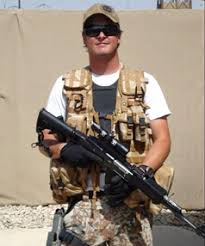




During the Vietnam years, my men often asked me "Why are we here?" I never had a good answer. Fighting communism seemed a weak response because the Vietnamese I interacted with could care less about capitalism or communism, they just wanted to be left alone. In your interviews/discussions there, I would be curious to know what our achievable objectives are and the timeframe. Seems the profiteers are looking at about 5 years before interest and money runs out.